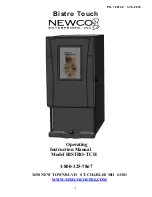
11
crossmembers. Confirm this runway has the hydraulic cylinder underneath. Also confirm
this runway has the hydraulic hose connection located at the front next to the powerpack
column. Make sure the cylinder bottom hinge is close to rear columns (see diagram #6
for cylinder direction). Insure that both the front and rear of the runway is seated
properly on both crossmembers. If the runway does not seat properly on both
crossmembers, carefully move one or both crossmember and column assemblies slightly
to fit on its crossmember support.
11. Carefully lift the right (passenger side) runway and set it securely on its support on top of
both front and rear crossmembers.
12. Route the lifting cables as shown in diagram #6. Insure that no cable is crossed during
this process. IMPORTANT: Insure all cables are completely contained and properly
seated in each sheave groove. (Install pulleys under the deck after properly laying the
cable.)
13. Secure each of the four cables in the wire rope anchor located at the shaft end of the
hydraulic cylinder. Put cable retainer(diagram #9, item 5) to secure cables.
14. Attached each cable to the proper column top plate using a washer and 3/4’’ nuts
(reference diagram #4).
15. Use a 4 ft. level to insure each column is vertically plumb and at a 90
º
angle to the
crossmember. Also insure opposite columns for each crossmember are symmetrical in
configuration. Make only minor adjustments to accomplish this.
16. Reconfirm column level and symmetric position relative to crossmember and opposite
column. Starting with the left front (powerpack) column, drill anchor bolt holes and install
anchor bolts (reference diagram #8).
17. Reconfirm column level and symmetric position relative to crossmember and opposite
column for each of the three remaining columns. Drill and install anchor bolts (reference
diagram #8). Shim anchor bolts if necessary.
18. Install runway approach ramps and wheel stops to the runways (diagram #15 and #16).
19. Install powerpack (diagram #5).
20. Route and connect hydraulic hose (diagram #7).
21. Route air line and connect to air solenoid (diagram #5 and diagram #14).
22. Fill powerpack reservoir with ISO grade 32 hydraulic oil (19 liters or 5 U.S. gallons).
23. Confirm electrical wire is sized for a minimum 30 amp circuit and supplying 208/230
volts. Use a separate circuit for each powerpack. Protect each circuit with a time
delay fuse or circuit breaker. For single phase power use a 30 amp fuse. For three
phase power use a 20 amp fuse. All wiring must comply with national and local codes.
NOTE:
All electrical wiring should be installed and connected by a
certified electrician
.
24. Connect powerpack to shop electrical system.
Summary of Contents for TLS430FDCEx1 Series
Page 23: ...23 Diagram 2 Front Crossmember...
Page 25: ...25 Diagram 3 Rear Crossmember...
Page 29: ...29 Diagram 6 Lifting Cable Routing...
Page 32: ...32 Diagram 8 Anchor Bolt Installation...
Page 33: ...33 Diagram 9 Driver Side Runway Assembly...
Page 41: ...41 Diagram 17 Power Unit Wiring Diagram...












































